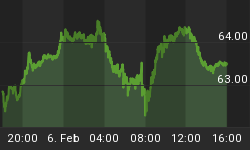Yesterday, as the dollar fell to new record lows and oil and gold prices surged to new highs, Wall Street remained fixated on wholly meaningless government data that managed to report the lowest inflation in the last half century. These bizarre numbers were integral in allowing the Commerce Department to report 3.9% annualized GDP growth in the third quarter, which was heralded by the bulls as evidence that a resilient U.S. economy had shrugged off the problems in the housing and mortgage markets. However, the government's ability to make "economic growth" magically appear is based purely on statistical finesse.
To arrive at this rate, the government had to assume that inflation during the quarter ran at an annualized rate of .8% (that's less than 1%). That is the lowest rate of inflation used to calculate U.S. GDP since the Eisenhower administration. With oil priced at almost $100 per barrel, gold futures trading over $800 per ounce, the dollar hitting record lows, and the Fed printing money like it is going out of style, the government has the nerve to claim that current inflation is the lowest it has been in half a century. Unbelievable!
Just in case there is some confusion, the government adjusts nominal GDP gains using the GDP deflator, which represents the inflation rate during the time period being measured. This is done to strip inflation out of the GDP calculation so that only real growth gets counted: not nominal gains that result purely from inflation.
The consensus estimate for 3rd quarter GDP growth was 3.4%. The reason we beat that number was that the government adjusted the nominal 4.7% gain by a mere .8%. Had the government assumed a higher rate of inflation, say 2.6% (identical to the rate used to deflate second quarter GDP,) the 3rd quarter gain would have been only 2.1%, well shy of the consensus forecast. My guess is that inflation is actually running at an annualized rate closer to 10%. Therefore using a more honest deflator, the U.S. economy is actually contracting, which would explain the recent anecdotal evidence provided by various economic polls, voter dissatisfaction and consumer sentiment numbers. In fact, if one simply measures U.S. GDP using gold or any other currency, it is clear that we are already in a recession.
Similar illusions are created in other numbers, such as retail sales, corporate earnings, and stock prices, which are all rising merely as a result of actual inflation being higher than the official reports. For example, higher retail sales reflect consumers paying higher prices for the products that they buy. They may in fact be buying less stuff, but are paying more for it. Further, part of the gains result from tourists using their appreciated foreign currencies to buy products cheaper here than they can in the own countries. I have heard about Canadians checking into U.S. hotels with empty suitcases, crossing the border to indulge in weekend shopping sprees.
Corporate earnings, particularly those of multi-nationals, are padded as their foreign currency denominated earnings translate into more dollars when those earnings are repatriated. However, such gains are illusions, as companies merely earn more dollars of diminished value for the goods they sell. The actual volume of exports does not necessarily improve much, as evidenced by weak industrial production and manufacturing employment. When those additional debased dollars are paid out as dividends, they confer no real increase in global purchasing power to shareholders.
Similarly, just as inflation causes prices to rise for goods and services it causes stock prices to rise as well. Though such gains may be less than the actual increase in the cost of living, as long as the government gets away with using bogus CPI numbers which fail to fully reflect inflation, Wall Street takes credit for nominal gains as if they were real.
However, as ridiculous as the phony GDP number was, yesterday's biggest joke was a report on global competitiveness put out by the World Economic Forum in Davos, Switzerland, which ranked the U.S. economy as the world's most competitive. To arrive at this conclusion, the forum has obliterated the obvious under a mountain of theory. In determining country rankings, the WEF weighed strengths in their "12 Pillars of Competitiveness", including: institutions, infrastructure, macroeconomic stability, health and primary education, higher education and training, goods market efficiency, labor market efficiency, financial market sophistication, technological readiness, market size, business sophistication and innovation. Completely ignored however are the measurable results of competitiveness, notably a trade surplus and a strong currency.
It is as if the WEF decided to judge a weight loss contest without using a scale, by instead focusing only on mental attitude, dedication, perseverance, and nutritional education! As a result the prize is awarded to the fattest contestant. Based on the empirical evidence of a gargantuan trade deficit, staggering global indebtedness, and a declining currency, the United States is clearly not the most competitive economy in the world.
For a more in depth analysis of the tenuous position of the American economy, the housing and mortgage markets, and U.S. dollar denominated investments, read my new book "Crash Proof: How to Profit from the Coming Economic Collapse." Click here to order a copy today.
More importantly, don't wait for reality to set in. Protect your wealth and preserve your purchasing power before it's too late. Discover the best way to buy gold at www.goldyoucanfold.com, download my free research report on the powerful case for investing in foreign equities available at www.researchreportone.com, and subscribe to my free, on-line investment newsletter at http://www.europac.net/newsletter/newsletter.asp.















